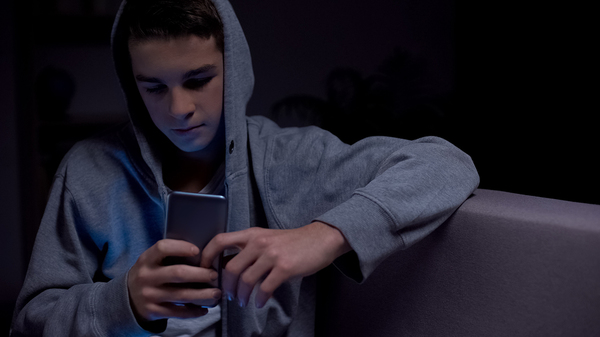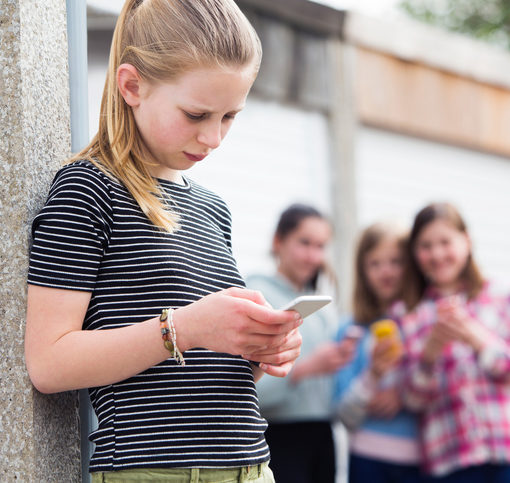While many parents and educators are concerned about the effect of a lot of screen time on children, many were relieved to pivot to online learning and online entertainment as a way to make sure that kids get education and socialization while staying safe and healthy during a pandemic. Living in the internet age has some real advantages. But it also has some real downsides, and it may be that the increased use of internet-connected devices during this crisis is bringing some of those downsides into sharper focus.
Some experts are concerned that cyberbullying – already a serious concern for many children – is experiencing an upswing since the start of the pandemic.
Why is Cyberbullying on the Rise?

At first glance, the reason why cyberbullying is on the rise seems simple enough – there’s more opportunity for it now. While in the past, parents have often focused on limiting the time their child spends looking at a smartphone screen or other device, now they may be encouraging it as a way to keep their children busy without sending them outside or to activities where they may be exposed to a virus. And in many areas, children are attending school and doing schoolwork and projects online rather than in a physical school. Additional hours spent online mean additional hours during which children are at risk of being bullied or for engaging in bullying behaviors themselves.
But it’s probably not just the increased opportunity that’s led to an increase in cyberbullying. Children who are at risk for bullying have fewer support systems in place than they normally would. Teachers, coaches, and others who see the child regularly and might notice that something is wrong and step in to intervene are now further removed from the child’s life, and may not have the opportunity to notice a change in their appearance or behavior that might signal bullying.
Some children might not want to talk to their parents about being cyberbullied, but might open up to someone else, like a teacher or guidance counselor, but those people aren’t as available to at-risk children right now. This means that at-risk children might be experiencing more bullying than they would if they were going about their routine as normal right now.
What’s more, children who are at-risk for engaging in bullying behaviors may be more likely to act out right now than they would without the pandemic. Everyone is experiencing some degree of upheaval as a result of the pandemic, and children are no exception. In fact, children may be experiencing more anxiety and frustration because of the efforts of the adults around them to act as if things are normal. Children are well aware that the situation they’re in isn’t normal, but the adults in their lives may be trying too hard to maintain a regular routine and act as if things are fine instead of talking to their children about what’s happening. Children who are feeling afraid and anxious may act out, sometimes by bullying other children.
So what can parents do to protect their children?
Speak Frankly With Your Children
It’s always important for parents to keep the lines of communication open with their children. But in the current environment, where children have far fewer safe adults that they can speak with face-to-face in their daily lives, it’s especially important to discuss serious topics frankly with kids.
- Be open about the risks of cyberbullying. Ask your children if they’ve encountered it – even if they haven’t experienced it themselves, they may have seen someone else experience it on social media or in a chat room.
- Find out if they’re worried about cyberbullying in the places that they frequent online.
- Encourage your child to come to you with their concerns and experiences.
- Keep asking your child to tell you about their day, even if you’ve been in the same house together all day. Unless you’re also sitting next to them on the computer, you don’t really know how their day online might have gone.
- While you’re at it, speak to your child about their fears and concerns about the pandemic, online school, and changes in the world right now.
You don’t have to have the answer for everything, but letting your child know that they’ve been seen and heard and that you’re willing to share information with them about what’s going on can allay some fears and help prevent acting out.
Make an Effort to Monitor

There are many reasons why children don’t tell their parents everything. Everything from a desire for privacy to fear of getting into trouble or getting someone else into trouble can contribute to a child failing to tell their parents about their experiences with cyberbullying. But you can’t keep your child safe if you don’t know what’s going on.
Parental monitoring software can be a valuable tool for parents, especially at a time when parents are relying on the internet for their children’s education and social activity. With the right parental monitoring software, you can see where your children are spending their time online, find out who they’re talking to, and even get snapshots of instant messages, text messages, and other material that will alert you to signs that your child might be dealing with a problem that they haven’t told you about.
To find out more about how parental monitoring software can work for your family, get our free trial





